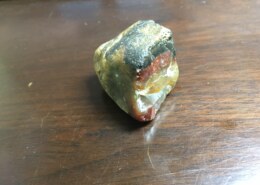
I found this amazing rock out in the middle of a field on my farm. It looks and feels like flint and or obsidian, it also looks a little bit fossilized on 2 sides of it. Any help ...
Sign up to join our community!
Lost your password? Please enter your email address. You will receive a link and will create a new password via email.
You must login to ask a question.
Please briefly explain why you feel this question should be reported.
Please briefly explain why you feel this answer should be reported.
Please briefly explain why you feel this user should be reported.
Geology 101 is the study of the Earth and its materials, structures, processes, and history. It is a broad field that encompasses many different disciplines, including mineralogy, petrology, paleontology, and geophysics. Geologists study the Earth’s physical features, including its rocks, ...
What is VMS? Assemblages of mostly sulfide minerals that develop on the seafloor at locations of concentrated hydrothermal discharge, relates to a kind of ore deposit that’s mined from existing oceanic crust formed underwater are Volcanogenic Massive Sulfides (VMS) Deposit. ...
Explore a comprehensive collection of Mining Geology Multiple Choice Questions (MCQs) for a thorough understanding of geological concepts in the mining industry. Test your knowledge and enhance your expertise with this curated set of questions, designed to cover key topics ...
Looking for an engaging and educational geology quizzes? Test your knowledge and expand your understanding of the Earth’s composition, rocks, minerals, and geological processes with our interactive geology quiz. Challenge yourself and see how much you know about geology. Start ...
Geology is the study of the composition of the Earth’s surface and under it and the events that have shaped it. It also includes methods for determining the absolute and relative ages of rocks discovered in a certain place and ...
Geology is the scientific study of the Earth, including its composition, structure, processes, and history. This fascinating field encompasses a wide range of disciplines, including mineralogy, paleontology, seismology, and more. Geology trivia questions are a great way to test your ...
Geology MCQs (Multiple Choice Questions) online are a great resource for students and professionals to test their knowledge and understanding of various geological concepts. These MCQs cover a wide range of topics in geology such as plate tectonics, rock formation, ...
Geology online Quizzes questions and answers. Free online quiz with multiple-choice questions (MCQ) without registration. Geology Multiple Choice Questions geology questions and answers | geology questions for competitive exams | geology exam questions. Geology quiz questions and answers.geology quizes. Geology ...
An unconformity is a surface of erosion or non-deposition that separates two rock units that have different ages. It represents a time gap in the geologic record, and it occurs when sedimentary rocks are tilted, uplifted, and eroded before new ...
Unveiling the Enigmas of the Earth’s Crust: Composition, Structure, Evolution, Significance, and Impact on Geology, Natural Hazards, Resources, and Climate Change. Introduction: The Earth’s crust is the outermost layer of the Earth and is the thinnest of the Earth’s three ...
All of the important processes of metamorphism that we are familiar with can be directly related to geological processes caused by plate tectonics. The relationships between plate tectonics and metamorphism are summarized in Figure. Most regional metamorphism takes place within continental ...
Sulfur is a chemical element with the symbol S and atomic number 16. It is a non-metal and belongs to the group of chalcogens. Sulfur is an essential element for life and is commonly found in proteins and other biomolecules. ...
Soil classification tests are methods of determining the physical and engineering properties of soils, such as moisture content, specific gravity, grain size distribution, Atterberg limits, and shear strength. These tests are important for geotechnical design and construction, as they help ...
The law of superposition is a fundamental principle in geology and archaeology that states that in a sequence of undisturbed sedimentary rocks or archaeological layers, the oldest layers are at the bottom, and the youngest layers are at the top. ...
An ophiolite is a section of oceanic crust and upper mantle that has been uplifted and exposed above sea level due to tectonic processes. Ophiolites are important geological features because they provide a window into the Earth’s interior and allow ...
A landslide is a geological phenomenon that occurs when soil, rocks, and debris suddenly move down a slope due to various factors such as gravity, erosion, seismic activity, or human activity. Landslides can cause significant damage to buildings, infrastructure, and ...
Mohs hardness scale The Mohs hardness scale is a qualitative scale used to measure the scratch resistance of various minerals or materials. It was developed by Friedrich Mohs, a German mineralogist, in 1812. The scale ranges from 1 to 10, ...